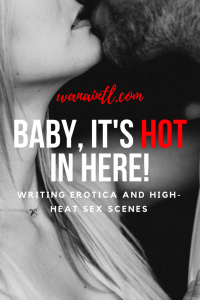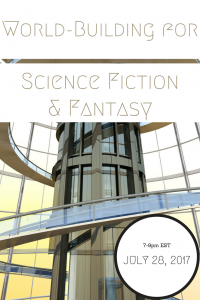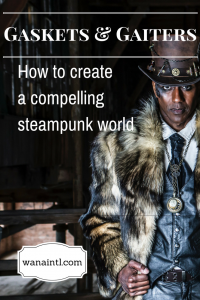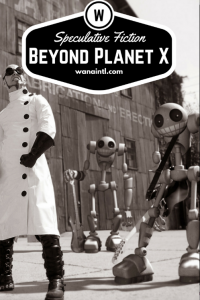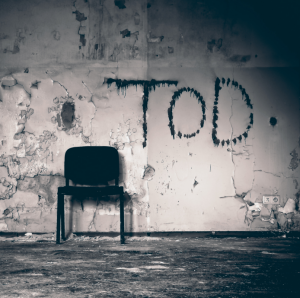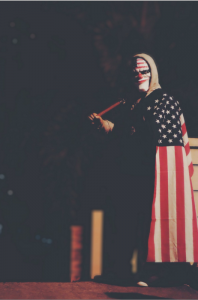Kristen Lamb's Blog, page 29
August 7, 2017
Six Simple Reasons Our Story Sucks & How to Fix It
[image error]
Why is it so many new novels are—to be blunt—crap? How can we find an author we love with one book, then all the love goes away with the next? What’s going wrong? What’s missing? Where did everything go wrong?
How can we learn and do better?
First and foremost, to be an author it’s imperative to embrace some healthy sadism. We’ll chat briefly on this so the “wrong turns” in story can become far easier to spot.
We MUST Go Against Our Nature
Humans have all kinds of intricate biological wiring that propels us to AVOID CONFLICT/PAIN. Now this is great namely because our desire to avoid pain is what keeps us alive and gainfully employed. It’s also how many of us are able to endure the holidays when forced to see family.
[image error]
This said, it is human to avoid conflict and to smooth everything over and civilization would implode if we didn’t heed our biology. We feel the rising anxiety and our nature steps in to “fix” everything and return to a nice comfortable homeostasis.
Avoiding conflict and pain can be healthy in life, but it spells death for fiction.
So here are a couple reasons your story might suck. Btw, remember while I have one finger pointing at you? Three are pointing back at me. I use these guideposts in my own work when I sense it’s starting to seriously suck.
#1—We Have Decoration Devoid of Substance
[image error]
I’m going to let you in on a little secret. Novels are not pretty sentences or even pretty words. Sure, it’s nice to have them, but they’re not entirely necessary.
It’s like a cake. Some cakes are so intricate they’re literally works of art, but cake is meant for people to EAT. So I’d much prefer a plain cake that is so yummy angels sing than to bite into a work of “art” and get a revolting mouthful of sugar-laden lard.
Same with stories. Stories, too, are meant to be ingested, to FEED us emotionally.
Fiction is about one thing and one thing only—PROBLEMS.
PROBLEMS are the “cake” of story.
I don’t emotionally connect to a cerulean sky or a painstakingly accurate description of a forest or an 18th century tea setting. I have zip-nada invested in an outfit, a garden or the layout of a room (that’s “icing”). Most people prefer cake with icing and readers like stories with description, setting, superlative prose etc. (though to the degree varies with reader preference).
All that “stuff” can make a story better, but they are NOT story, just like icing is not cake.
#2—We Have No Plot
[image error]
Plot is basically a fancy way of saying we have a core problem in need of resolution (cake) and a plan (recipe) to do just that.
I cannot connect emotionally with a detailed description of a designer outfit, but I can connect with the woman who’s wearing this outfit. I don’t care all that much about the outfit, I care about the woman and the why behind the outfit.
What is she hiding? What is she up against? What must she face to become whole?
Is she in this outfit because she desperately needs a job? Because it hides the bruises from her emotionally and physically abusive husband who controls her life? The one she must find the courage (and job) to escape?
This is why I’m a huge believer in writers being able to articulate what their story is about in ONE sentence. If we can’t do that? Odds are we have icing and no cake. Or maybe a cake that’s half-baked or missing key ingredients.
#3—We Have No Clear Plot Goal
[image error]
All stories have ONE CLEAR FINAL goal. And I don’t want to hear the BS copout of:
“Well, my story is literary and character-driven. Her goal is she wants to find out who she is.”
Aside from the fact that literary and character-driven stories don’t automatically get a pass on a plot, why do we care? What happens if the protagonist doesn’t find out ‘who she is’? Why is it important? What are the stakes? Why should I (the reader) root for her?
Besides that is the wrong question entirely.
Regardless of genre, the protagonist is never finding out who she is, rather what she is made of.
For that to happen? We need a PLOT PROBLEM.
Clear plot problems offer context. If I (reader) have not been clearly shown the story problem, then I’ll be quickly bored because I lack context that makes any setback a setback.
It’s like showing me a guy driving off for a destination and not telling me where he’s going. Yet, if I know he’s driving to Canada from Texas, then accidentally turning down I-35 South because he’s arguing with his ex on the phone MEANS SOMETHING.
I can clearly SEE he’s headed for MEXICO, not Canada. The wrong turn means something and so does every setback which creates bigger and badder problems (which turns pages, btw).
By DEFINITION a setback can only happen when there is an actual goal.
We need a Death Star, a Mount Doom, and a Labyrinth or….meh.
Same in character-driven stories. We root for Evelyn Couch in Fried Green Tomatoes because we know the final goal is her growing a spine. We know she has “won” when she stands up to her bullies and to the husband who’s disrespecting her.
Bad situations are not a plot. It’s soap opera writing. Soap operas get forty years and go into infinity. Novels don’t have that luxury.
#4—Too MUCH SUGAR
[image error]
We’re being way too nice. I see way too many new manuscripts and the reason they’re boring the paint off the walls is nothing is happening and everything is too easy. Everyone gets along is super sweet and lots of colorful pretty descriptions and empty calories that make us sick.
Humans have fears and faults and failures that will collide, especially under pressure. I see far too many manuscripts where nothing is happening. People talking.
Description not friction. No friction? No traction.
#5—We’re Making it TOO Easy
[image error]
Yes, your protagonist has ONE core story goal in need of resolution, but there should be a ton of hardship, suffering, setbacks and pain along the way. Our protagonist must work for everything and earn every reward, even the small ones with blood, sweat and sacrifice. NOTHING should be easy. Ever.
Authors deal in solid gold rewards, not plastic participation trophies.
If our protagonist is being spoon fed the answers (dreams, journals, letters, flashbacks, “super helpful” ancillary characters) that’s cheating. If the protagonist is rescued constantly by others and it never pushes any pain points? Where’s the glory in that?
When I was in Brazilian Jiu Jitsu, most people don’t last a month. Most females never make it past white belt. It takes a YEAR to earn blue belt. I had to do this grappling men twice my size.
It took me a year and a half of busted lips, blood, bruises, and strains. It also cost me a broken nose and a dislocated knee…but guess what’s framed in my office?
[image error]
I can tell you that had I been handed a blue belt for attendance, it would be in some junk drawer along with the piles of other worthless awards.
Same in fiction. We revel in the protagonist’s victory only when the title of “HERO” is earned.
#6—We Forgot to Turn on the Heat
[image error]
The greater the stakes the better the story. No heat and we don’t have cake, we have batter. Same in fiction. Turn on the heat.
A friend of mine had a brilliant idea for a story, but her niceness kept killing it. She emailed me that her story is about an artist who has five years to make it in NYC or he has to return to his family’s house-painting business.
I replied: NOOOOOOOOOOO!
If our artist has five years in the beginning? We aren’t too worried. There’s time. But if we know he’s at the end of five years and has only one final narrow window? Everything changes.
If the stakes are he returns to an occupation close to what he loves (painting) and also limited seasonally (house painting in NY) it isn’t that big of a deal. He can dream away what he longs to create while on a ladder touching up eaves. He also will have seasons he can still create art.
But, what if he’s returning to a job that is not only the opposite of what he loves, but can potentially drain every creative molecule from his soul? A stressful occupation that might just kill him with seventy-hour work weeks (accounting firm)? Or physically endanger his hands/ability to paint (family auto repair business)?
And while we are at it? He’ll have to return to a family that never really was supportive and will be delighted he failed and relish rubbing it in.
NOW we have a story 
August 4, 2017
What Becomes of the Broken-Hearted? Why Fiction Heals Like Nothing Else Can
[image error]
Lately we’ve been talking a lot about what differentiates the decent stories from the ones that gut hook us and don’t let go. In my opinion the truly superlative stories stand out in one way. We are not only entertained…we are changed. We aren’t the same person we were when we flipped open to page one and decided to give the story a go.
By the end, through characters, trials, challenges, heartbreak, ruin and victory we are forever a different person. The story generates a chemical change, rendering us a cake that can’t be unbaked.
Great stories (and the authors who pen them) serve us fresh insight into ourselves and others, a different perspective on the world around us. They might reveal a darkness we never noticed or were to afraid to face or offer hope we didn’t know we could have.
Most vital of all, these stories provide perspective we could gain no other way.
Fiction is the only way we can step into the shoes of a broken, pathetic alcoholic (Girl on a Train), an aging heavy metal rock star burdened by false guilt who never truly escaped the sadistic father who turned his childhood into a hell (Heart-Shaped Box).
We can know what it is to feel like life is no longer worth living once we’ve outlived our usefulness even if we are young (A Man Called Ove). We can experience the gross injustice and humiliation of being a black maid in the American South during the 60s (The Help) no matter what color our skin.
Regardless of race, faith, gender, or background, stories allow us into a perspective to experience life, to encounter our own wounds (wounds common across all of humanity) from a different vantage point. We come to appreciate how seeing our pain worked out through another gives us the psychic distance necessary for us recognize then heal the pain that in real life we can’t yet touch…without screaming.
The Battle of Logic & Emotion
[image error]
I find it interesting that scientists really don’t have a definitive reason WHY we dream. Is is the brain defragging? The subconscious mind revealing what we can’t see when we’re awake because the left brain rushes in with a logical explanation?
When left brain gets a vote, it’s all too easy to miss the wolf in sheep’s clothing.
He wasn’t being mean. It was a joke. He’s right. I don’t have a very good sense of humor.
But fiction? Fiction is emotion. Fiction is primal and hooked directly into the right brain. Dreams are not ruled by logic, but they are extremely limited in what they can do once we’re up and have had our coffee. But, there’s another way…STORY.
Yet how do so many of us tackle our demons?
If you’re like me, you read self-help books about self-esteem, boundaries, forgiveness and healing and while these books can offer a lot of great information, (in my POV) they’re talking to the wrong side of the brain.
We can read all the self-help books about forgiveness, but what happens when we come face to face with our betrayers? When we have to be in the same room with flesh-and-blood villains who have zero remorse over the ruin left in the wake of their actions? The liars, pillagers, and plunderers we once supported, loved and trusted…who knifed us in the back and never shed a tear after leaving us like this.
[image error]
I can tell you what happens when we face these folks.
We’re calm and composed and easily recall the breathing exercises, meditation, and self-affirmations spoken into a mirror. We stare into our betrayer’s face knowing we’re a better person who’s done a lot of therapy and exercises. We even composed long letters of how this person hurt us, burned the letters and let the embers fly away on zephyrs delivering our pain into the sky and to the unicorns.
And everything is okay because we know hurting people hurt people….and….
%$#& THAT $#!%!
Reptile brain rises up like a hidden viper threatening to sink its fangs into left brain’s soft gray matter if is says one frigging reasonable word.
[image error]
While left brain is the calm, enlightened negotiator, reptile brain is Old Testament and Old School and believes an eye for an eye. Right brain is raw emotion and the one who’s closest to the reptile (brain) inside all of us.
What happens next in such a confrontation can be placed anywhere on a large continuum from getting in a shouting match spewing venomous words to ending up on an episode of Dateline.
Right brain is creative, thus good at hiding bodies.
Why Fiction?
Yes, self-help books and therapy, etc. have a place, but I don’t think they’re nearly as well-suited for healing wounds as story is. Why is that?
Because we cannot heal emotional wounds with logical poultices.
It’s like trying to halt a runaway MRSA infection with anti-depressants. Infection is virus and it needs something anti-viral, equipped to surround and dismantle the invasion.
Same thing goes for psychic wounds.
The wounds created BY emotion (betrayal, abandonment, exploitation, abuse) can only be healed WITH emotion. Inner demons and wounds are by nature emotional, thus in the realm of the right brain (and limbic brain). This means the right brain is far better suited (perhaps even DESIGNED) to stop the “infection” and heal the damage.
[image error]
When we read fiction and vicariously experience our hurts, failures, disappointments, betrayals through another set of eyes, it’s a way of facing our villains in life. We get a place to feel these emotions, but better still? Story shows us it is possible to come through the fire not only healed, but stronger and better.
By reading all kinds of stories with characters battling a vast variety of problems, we can experience far greater empathy, compassion, understanding and forgiveness. It’s also far more effective than coldly analyzing our baggage on a flow chart.
Mending the Broken
[image error]
For me, my greatest AH-HA moments have come from fiction. Stories have allowed me another way of looking at myself and my pain.
The most recent example of this came from Heart-Shaped Box. Sure it’s a horror, the story of a vengeful ghost hot on the tail of an aging rock star. Yet, oddly enough, this story changed my perception of myself more than a stack of self-help books and years of well-meaning therapists ever did.
Fifty-four-year-old rock star (Judas Coin) is on the run from a vengeful spirit with his goth girlfriend (Georgia) who’s half his age. I could relate to Georgia, though our backstory is different.
She believes she’s damaged goods, worth nothing and grateful for the crumbs that fall from the table. She’s had a hard life filled with exploitation, pain, failure and shame and, as a result, chooses men she knows will hurt her because suffering is what she deserves.
The Lightning Strike
[image error]
Judas and Georgia have a conversation at a Denny’s during a brief reprieve from the ghost who’s hunting them and end up on the topic of kids. She says she’s never had kids because she’s too afraid they’ll find out about her. Judas asks what exactly her kids would find out. This next bit is some of the most powerful dialogue I’ve ever read.
Georgia: “That I dropped out of high school. That when I was thirteen I let a guy turn me into a prostitute. The only job I was ever good at involved taking my clothes off to Mötley Crüe for a room full of drunks. I tried to kill myself. I been arrested three times. I stole money from my grandma and made her cry. I didn’t brush my teeth for about two years. Am I missing anything?”
Judas: “So this is what your kid would find out: No matter what bad thing happens to me, I can call my mother, because she’s been through it all. No matter what shi##y thing happens to me, I can survive it because my mom’s been through worse, and she made it.” ~ Heart-Shaped Box by Joe Hill (page 171).
I remember this part of the novel hitting me like a bolt from the sky and I burst out crying, the moment of catharsis so raw and visceral. I once was Georgia (maybe a part always will be). Because of my life experiences, I too believed I was damaged goods.
Because I empathized with Georgia (similar demons) I could vicariously experience her breakthrough, that WOW moment when Judas completely reframes what she’s just said. She isn’t “damaged goods” at all. Rather, she’s like furniture that’s been battered and scratched that collectors pay big bucks for because it’s “distressed” and thus more interesting and far more valuable because of its damage and scars.
I’m sure a zillion well-meaning friends or shrinks told me the same thing. Probably read similar notions off faded Post-Its on the bathroom mirror, so why didn’t the happy, happy mantras stick? Why didn’t these affirmations melt me, undo me and remake me?
[image error]
It’s because that left-brain approach is too sterile, and it doesn’t shove us face first into what we need to face. Fiction, on the other hand is ugly and dirty and raw. It provides intimacy and slams that psychic distance tight (while we still are technically “safe”).
Real fiction, the good stuff, reveals that the worthless “damaged goods” in truth, are valuable and maybe even priceless. The story shows the protagonist his or her worldview, their perception of themselves is faulty and through the crucible remolds the protagonist into what we call a hero. This is why I challenge all of you to be fearless in your stories, because if you can be fearless? So can your readers and they will love you for it.
What are your thoughts? I like good self-help books and therapy is important and often vital. But fiction really has a way of grabbing me by the scruff and shaking me. Have you ever read a book that completely revealed something about your own wounds? That helped you? Gave you insight? Helped you heal?
I believe all genres have the ability to give us tremendous healing and hope y’all will check out my Speculative Fiction Class where we are going to bore into the grit and heart of the dark stuff.
I love hearing from you!
For the month of AUGUST, for everyone who leaves a comment, I will put your name in a hat. If you comment and link back to my blog on your blog, you get your name in the hat twice. What do you win? The unvarnished truth from yours truly.
I will pick a winner once a month and it will be a critique of the first 20 pages of your novel, or your query letter, or your synopsis (5 pages or less).
July’s winner will be listed next week.
****And MAKE SURE to check out the NEW CLASSES classes below (including writing layered characters and strong females) and sign up!
Summer school! YAY! We’ve added in classes on erotica/high heat romance, fantasy, how to write strong female characters and MORE! Classes with me, with USA Today Best-Selling Author Cait Reynolds and award-winning author and journalist Lisa-Hall Wilson. So click on a tile and sign up!
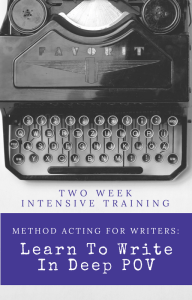 Method Acting For Writers: How to Write In Deep POV. $85.00 USD. August 1, 2017 - August 14,2017. Click the image to register!
Method Acting For Writers: How to Write In Deep POV. $85.00 USD. August 1, 2017 - August 14,2017. Click the image to register!
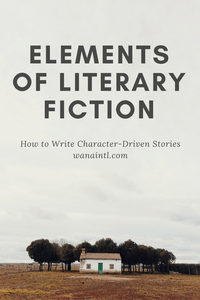 Elements of Literary Fiction. $40.00 USD. Thursday, August 3, 2017. 7:00-9:00 p.m. EST. Click the image to register!
Elements of Literary Fiction. $40.00 USD. Thursday, August 3, 2017. 7:00-9:00 p.m. EST. Click the image to register!
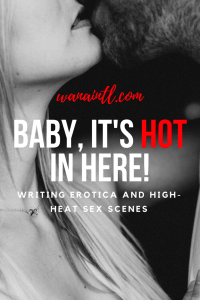 Baby, It's Hot in Here! Writing Erotica & High-Heat Sex Scenes. $45.00 USD. Friday, August 4, 2017. 7:00-9:00 p.m. EST. Click the image to register!
Baby, It's Hot in Here! Writing Erotica & High-Heat Sex Scenes. $45.00 USD. Friday, August 4, 2017. 7:00-9:00 p.m. EST. Click the image to register!
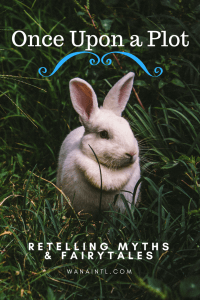 Once Upon a Plot. $45.00 USD. Wednesday, August 9, 2017. 7:00-9:00 p.m. EST. Click the image to register!
Once Upon a Plot. $45.00 USD. Wednesday, August 9, 2017. 7:00-9:00 p.m. EST. Click the image to register!
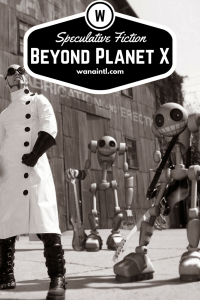 Beyond Planet X. $35.00 USD. Thursday, August 10, 2017. 7:00-9:00 p.m. EST. Click the photo to register!
Beyond Planet X. $35.00 USD. Thursday, August 10, 2017. 7:00-9:00 p.m. EST. Click the photo to register!
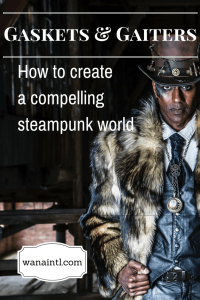 Gaskets and Gaiters. $45.00 USD. Friday, August 11, 2017. 7:00-9:00 p.m. EST. Click the photo to register!
Gaskets and Gaiters. $45.00 USD. Friday, August 11, 2017. 7:00-9:00 p.m. EST. Click the photo to register!
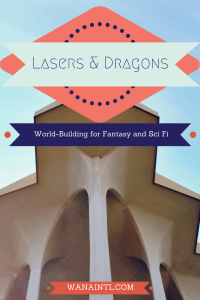 Lasers & Dragons. $45.00 USD. Friday, August 18, 2017. 7:00-9:00 p.m. EST. Click the image to register!
Lasers & Dragons. $45.00 USD. Friday, August 18, 2017. 7:00-9:00 p.m. EST. Click the image to register!
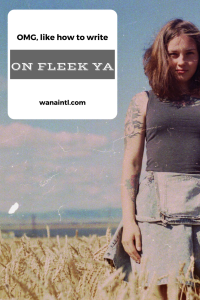 OMG! Like, How to Write On Fleek YA. $40.00 USD. Wednesday, August 23, 2017. 7:00-9:00 p.m. EST. Click the image to register!
OMG! Like, How to Write On Fleek YA. $40.00 USD. Wednesday, August 23, 2017. 7:00-9:00 p.m. EST. Click the image to register!
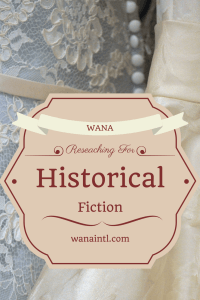 Researching for Historical Fiction. $40.00 USD. Friday, August 25, 2017. 7:00-9:00 p.m. EST. Click the image to register!
Researching for Historical Fiction. $40.00 USD. Friday, August 25, 2017. 7:00-9:00 p.m. EST. Click the image to register!
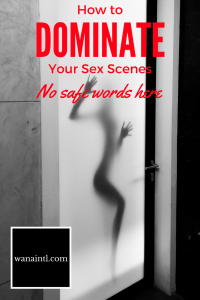 How to Dominate Your Sex Scenes (No Safe Words Here). $45.00 USD. Wednesday, August 30, 2017. 7:00-9:00 p.m. EST. Click the image to register!
How to Dominate Your Sex Scenes (No Safe Words Here). $45.00 USD. Wednesday, August 30, 2017. 7:00-9:00 p.m. EST. Click the image to register!
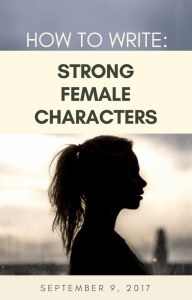 Class Title: Beyond Lipstick and Swords: Creating Strong Female Characters. $40.00 USD. Saturday, September 9, 2017. 2:00-4:00 p.m. EST. Click the image to register!
Class Title: Beyond Lipstick and Swords: Creating Strong Female Characters. $40.00 USD. Saturday, September 9, 2017. 2:00-4:00 p.m. EST. Click the image to register!
August 2, 2017
From Margin to Mainstream: Why Erotica Matters
It’s Wednesday, which is on its way to being officially renamed in the U.S. calendar of holidays as “Cait Reynolds Blogs for Kristen Lamb” Day. Denny Basenji, however, thinks it should be renamed “Curly Tail Problems” Day.
[image error]
Announcing that you write erotic romances is certainly a conversation starter. Or stopper. Depending on your audience. Explaining that this is your livelihood and that you are proud of it will get you reactions from, “Wow, that’s cool!” to, “So, when are you going to write a real book?”
Let’s just get something straight, right off the bat. Erotica today is not “porn in pretty dresses.”
One of the first ground rules for taking an objective look at the changing face of romance publishing is to separate the quality of the writing from the message of the content.
The message of today’s romance, erotic romance, and erotica novels is that women are free to associate themselves (and pay the money to buy the books to drive this point home) with sexually experienced, sexually adventurous, and sexually knowledgeable heroines. Heroes today are expected to spend as much, if not more, time focused on the heroine’s pleasure than their own.
While certain tropes like the Cinderella rescue persist, the nature of their portrayal has changed. For example, you now find the Cinderella rescue scenario played out in LGBTQ romances as much as heterosexual romances. Often the “heroine” is just as or more successful professionally than the “hero” (regardless of gender or orientation).
Heroes now have room to be complex, and heroines can genuinely be strong. Erotic romance novels fearlessly explored issues of mental illness, adoption, divorce, depression, anxiety, socio-economic differences, even while so-called “mainstream” books were still tip-toeing around sensitive topics.
The readers of these erotic romances are a truly diverse group, and people are starting to take note of this sociological change (and you can thank good ol’ “Fifty Shades” for the mainstream media attention erotic romance has gotten).
But who are the writers of these books? These are men and women who sit down, day in and day out, and put fingers to keyboard to produce these stories. I am one of them.
I used to be tremendously embarrassed by the fact that I wrote erotica. I felt like everyone was always expecting me to use it as a “stepping stone” to my “real books.”
[image error]
Well, guess what? The books I write as Fiona Blackthorne ARE real books. I lost sleep, tweeted, swore, chatted, paced, dog-walked, typed, ground my teeth, wrote notes on receipts, and sketched out entire storyboards for these books. I had to submit them to my publisher, Siren Publishing, wait for them to be accepted, then go through an intense, fast-paced editing phase that would leave your head spinning. Then, there’s all the marketing work I had to do to get my website up and running, and promoting my books.
Yes, I work from home, and yes, I can start my day in my pajamas. But my workday starts at 7:00 a.m. and doesn’t really stop until I go to bed. Sure, I can change the laundry in between chapters, but you can bet I’m still working through a paragraph in my head. Yes, I have a flexible schedule. That just means that if I need to work from 7pm to 2am because my day was already full of other stuff, then I’ll suck it up and work from 7-2.
You want to know what it’s like to write a sex scene…or seven for a book? Sometimes, it’s a delightful literary challenge, because I never want to write a sex scene the same way twice. I always am looking for different words, moments, things to notice, ways to enhance the experience for my reader. Sometimes, it’s good fun for *ahem* me as well.
Sometimes, though? Sometimes, it’s like pulling freaking eye-teeth. You can get really tired of writing sex scenes. You always have to be on your guard against dropping into the mechanical and clinical just to get through it.
Then there are those moments when you are thinking to yourself: “Okay, about 700 words left in the chapter. That means if I can get her to her climax, then, hmmm, no, that won’t take enough words. He’ll have to stop just short of it. Oh, and then he can actually pick her up and put her on the bed. That’s about fifty words right there. Then maybe he ties her up? That could be a good hundred words or so, and I could finish this goddamn scene in 500 words after that.”
[image error]
Yeah. It happens.
Then, I remember Anais Nin, Henry Miller, D.H. Lawrence, and I am strong again.
Erotic writing has been around for as long as the oldest profession has been around…and when people couldn’t read or write, they carved things on walls and painted them in caves. Clearly, something that is so deeply tied to our biological drive for survival and procreation deserves attention, study, and respect, not dismissiveness or judgment.
This is why I am teaching a class on writing erotica. We write the stories that are the mirrors reflecting the changes in society’s sexual mores and gender roles. Good, bad, indifferent, it is our writing that helps to push boundaries, expand horizons, and drive acceptance.
Who are the writers of erotic romance? Why do they write this when they could simply leave out all the sex? What are the blessings and consequences of this life? For once, it’s time to tell our own stories.
Baby, It’s Hot in Here!…a Sizzling New Class from Cait Reynolds
Price: $45 USD
Where: W.A.N.A. Digital Classroom
When: Friday, August 4, 2017
Erotica is one of the most difficult genres to write.
Wait. No. Erotica is one of the most difficult genres to write well.
From pacing (literally) to placing, this class is gonna go…deep. Yeah. Couldn’t resist. In all seriousness, how do you handle the paradox of writing a book with compelling characters and interesting story when it’s really about sex?
The answer is this: good erotica is not about sex. It is about seduction and intimacy. In this class we will cover:
Understanding why readers choose erotica, what they are looking for, and how to both deliver and guide them to wanting more;
How to apply and adapt standard plotting structures to erotica;
Creating a story that is interesting enough to sustain a full-length novel;
Developing characters that are complex, memorable, and desirable;
Avoiding repetitive, mechanical sex scenes;
Maintaining the heat throughout a book;
How to push yourself to write better and use quality as a unique marketing strategy;
Bonus: history, fun facts, and trivia about literary erotica through history!
A recording of this class is also included with purchase.
In a world of a gazillion forgettable erotica books and romance novels, let Cait help you stand out in the one way no marketing can compete with: hot, unique stories that turn readers into fans who will BEG you for more!
Erotica GOLD
You get the class (recording included in price) with Cait plus one hour of personalized one-on-one consulting regarding YOUR story.
Erotica PLATINUM
You get the class (recording included in price) with Cait plus two hours of personalized one-on-one consulting regarding YOUR story and a detailed edit and critique of one sex scene up to 2,500 words.
Register today!
About the Instructor
 Cait Reynolds is a USA Today Bestselling Author and lives in the Boston area with her husband and four-legged fur child. She discovered her passion for writing early and has bugged her family and friends with it ever since. When she isn’t cooking, running, rock climbing, or enjoying the rooftop deck that brings her closer to the stars, she writes. Learn more at http://caitreynolds.com.
Cait Reynolds is a USA Today Bestselling Author and lives in the Boston area with her husband and four-legged fur child. She discovered her passion for writing early and has bugged her family and friends with it ever since. When she isn’t cooking, running, rock climbing, or enjoying the rooftop deck that brings her closer to the stars, she writes. Learn more at http://caitreynolds.com.
For the month of AUGUST, for everyone who leaves a comment, I will put your name in a hat. If you comment and link back to my blog on your blog, you get your name in the hat twice. What do you win? The unvarnished truth from yours truly.
I will pick a winner once a month and it will be a critique of the first 20 pages of your novel, or your query letter, or your synopsis (5 pages or less).
****And MAKE SURE to check out the NEW CLASSES classes below (including writing layered characters and strong females) and sign up!
Summer school! YAY! We’ve added in classes on erotica/high heat romance, fantasy, how to write strong female characters and MORE! Classes with me, with USA Today Best-Selling Author Cait Reynolds and award-winning author and journalist Lisa-Hall Wilson. So click on a tile and sign up!
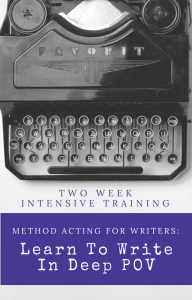 Method Acting For Writers: How to Write In Deep POV. $85.00 USD. August 1, 2017 - August 14,2017. Click the image to register!
Method Acting For Writers: How to Write In Deep POV. $85.00 USD. August 1, 2017 - August 14,2017. Click the image to register!
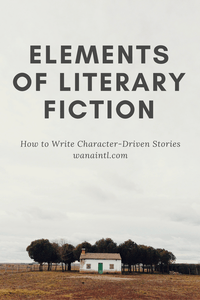 Elements of Literary Fiction. $40.00 USD. Thursday, August 3, 2017. 7:00-9:00 p.m. EST. Click the image to register!
Elements of Literary Fiction. $40.00 USD. Thursday, August 3, 2017. 7:00-9:00 p.m. EST. Click the image to register!
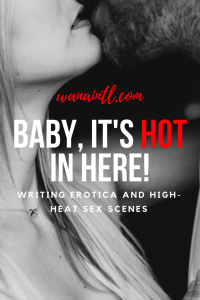 Baby, It's Hot in Here! Writing Erotica & High-Heat Sex Scenes. $45.00 USD. Friday, August 4, 2017. 7:00-9:00 p.m. EST. Click the image to register!
Baby, It's Hot in Here! Writing Erotica & High-Heat Sex Scenes. $45.00 USD. Friday, August 4, 2017. 7:00-9:00 p.m. EST. Click the image to register!
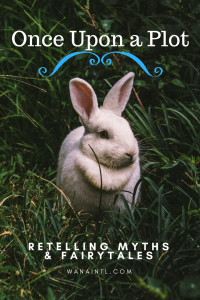 Once Upon a Plot. $45.00 USD. Wednesday, August 9, 2017. 7:00-9:00 p.m. EST. Click the image to register!
Once Upon a Plot. $45.00 USD. Wednesday, August 9, 2017. 7:00-9:00 p.m. EST. Click the image to register!
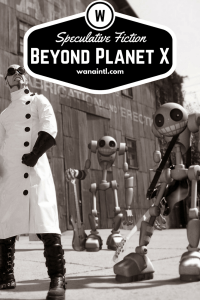 Beyond Planet X. $35.00 USD. Thursday, August 10, 2017. 7:00-9:00 p.m. EST. Click the photo to register!
Beyond Planet X. $35.00 USD. Thursday, August 10, 2017. 7:00-9:00 p.m. EST. Click the photo to register!
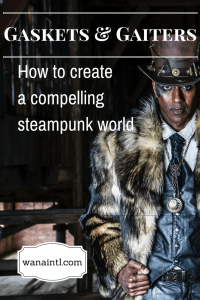 Gaskets and Gaiters. $45.00 USD. Friday, August 11, 2017. 7:00-9:00 p.m. EST. Click the photo to register!
Gaskets and Gaiters. $45.00 USD. Friday, August 11, 2017. 7:00-9:00 p.m. EST. Click the photo to register!
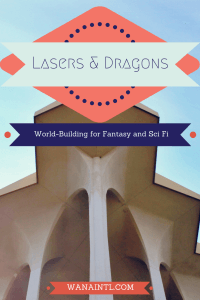 Lasers & Dragons. $45.00 USD. Friday, August 18, 2017. 7:00-9:00 p.m. EST. Click the image to register!
Lasers & Dragons. $45.00 USD. Friday, August 18, 2017. 7:00-9:00 p.m. EST. Click the image to register!
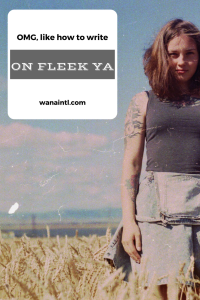 OMG! Like, How to Write On Fleek YA. $40.00 USD. Wednesday, August 23, 2017. 7:00-9:00 p.m. EST. Click the image to register!
OMG! Like, How to Write On Fleek YA. $40.00 USD. Wednesday, August 23, 2017. 7:00-9:00 p.m. EST. Click the image to register!
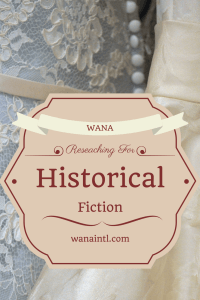 Researching for Historical Fiction. $40.00 USD. Friday, August 25, 2017. 7:00-9:00 p.m. EST. Click the image to register!
Researching for Historical Fiction. $40.00 USD. Friday, August 25, 2017. 7:00-9:00 p.m. EST. Click the image to register!
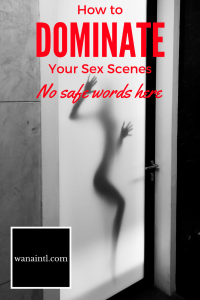 How to Dominate Your Sex Scenes (No Safe Words Here). $45.00 USD. Wednesday, August 30, 2017. 7:00-9:00 p.m. EST. Click the image to register!
How to Dominate Your Sex Scenes (No Safe Words Here). $45.00 USD. Wednesday, August 30, 2017. 7:00-9:00 p.m. EST. Click the image to register!
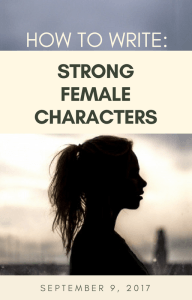 Class Title: Beyond Lipstick and Swords: Creating Strong Female Characters. $40.00 USD. Saturday, September 9, 2017. 2:00-4:00 p.m. EST. Click the image to register!
Class Title: Beyond Lipstick and Swords: Creating Strong Female Characters. $40.00 USD. Saturday, September 9, 2017. 2:00-4:00 p.m. EST. Click the image to register!
July 31, 2017
Wonder Woman vs. Atomic Blonde–What Truly Makes a Powerful Female Character?
[image error]
I am a sucker for a strong female character and these gun-wielding, sword-swinging gals are skyrocketing in popularity both in books and film. 2017 has served up both Wonder Woman and Atomic Blonde, two characters who are as different as Amarillo and the moon, and this has given me a lot of food for thought.
What makes a female character truly bad@$$?
Last week I watched the pilot for Midnight, Texas and, like most shows, I’m undecided how I feel about it. It usually takes at least three episodes for me to get a clear picture of whether I want to remain or bail.
I loved True Blood and am a fan of Charlaine Harris. As a Texan and an author who writes stories set in Texas, this series of course piqued my interest.
Overall I enjoyed the pilot, but there was one scene that bugged the dickens out of me and thus prompted me to write a post about creating strong female characters.
More about Midnight later and what hit the sour note.
There’s No Mystery Why the Bad@$$ Female Has Gained Appeal
Being an older gal, I remember a time when every woman in every show twisted an ankle. She huddled in a corner panicking and weeping waiting for a man to save her instead of standing up and being useful instead of just decorative. I also recall being a seriously ticked off five-year-old.
[image error]
Why was she just sobbing in a pile instead of picking up the gun? Tire iron? Whatever.
As a kid of the 80s our female action heroines were Charlie’s Angels *rolls eyes* but it was a start…even though this magazine cover (below) gives me gun safety apoplexy.
*Kristen breathes into paper bag*
[image error]
But back in the day it was a fresh idea. Take some pretty women with lots of lipgloss and even more hairspray, hand them guns and —> POWER.
Oh-kay….
Terminator & The Tectonic Shift
For me, Terminator 2 was a tectonic shift in how women could be viewed in terms of an “action hero” especially since I was the only girl in 1985 taking martial arts instead of ballet. When I initially competed in karate, there were no “girls” divisions so I competed against boys.
With T2, finally there was a female action hero for me!
Yet, it seemed like Hollywood completely missed the point of Sarah Connor. Yes, in T2 she is all buff and devoid of emotion, fixated on a singular objective and willing to use any means to get there.
But that was because the STORY compelled such a character. After what Sarah endured, witnessed and survived in T1, she inadvertently became the very thing she sought to destroy. In her desire to defeat the Terminator, she’d become the very thing she hated.
Kyle Reese gives us the foreshadowing of this in T1.
It can’t be bargained with. It can’t be reasoned with. It doesn’t feel pity, or remorse, or fear! And it absolutely will not stop, ever, until you are dead!
He says these words regarding the Terminator, yet this is eerily prophetic regarding Sarah in T2.
The Sarah Connor of T2 was a METAPHOR, not the singular template for what makes a bad@$$ female action hero.
[image error]
Yet, T2 set the pattern for over two decades of one-dimensional, bitter, unfeeling and often unlikable female action heroes from Lara Croft in Tomb Raider, to Evelyn Salt in Salt, to the female assassin Fox in Wanted and now we get Lorraine Broughton in Atomic Blonde.
Though I haven’t seen Atomic Blonde yet, I’ve watched enough clips and trailers to know she’s basically John Wick with boobs. Which *shrugs* is cool.
To be clear, I watch and enjoy a lot of these movies and I think they have a place. For instance, no one expects James Bond or Ethan Hunt (Mission Impossible) to be dimensional.
We expect these guys to have fast cars, cool gadgets, woo beautiful and often dangerous women, and take out the bad guy in new and creative ways. I’m certain Atomic Blonde will deliver the same, because that’s the movie’s goal.
[image error]
Yet, in my POV, the female action hero who can shoot and fight as well or better than any man has gone from breaking ground (and glass ceilings) and devolved into a die cut trope. In short, this assembly-line character is low-hanging fruit when it comes to storytelling.
I’m sure Atomic Blonde will have all kinds of cool fight scenes and I’m beyond impressed with Charlize Theron and what she did to prepare for the role. Atomic Blonde is groundbreaking for me in that Hollywood cast an over-forty female and not some twenty-something Megan Fox clone.
For that? They get major applause from me.
I know Lorraine Broughton will thrill and electrify me. She will not, however, be my hero which makes me wonder WHY?
Why Wonder Woman is STILL My Hero
[image error]One of the many reasons the newest rendition of Wonder Woman had me in tears through most of the movie is the creators ignored the low-hanging fruit and reached higher…MUCH MUCH higher.
We weren’t handed (yet again) what boiled down essentially to a man with girl parts. We had a fully realized and definitively feminine heroine. Additionally, her femininity didn’t “lessen” her.
The story showed us that a woman wasn’t required to become a man in order to be powerful.
THIS is what I feel is a superlative example of a female action hero. Yes, she is amazing with her fighting skills and ability with weapons etc. but the creators didn’t stop there. What made Diana even more powerful (to me) was she possessed innocence and naivete and was motivated by love and compassion not some bitter backstory.
For me, Wonder Woman demonstrated more power in a singular act of undeserved mercy than every Jolie female bad@$$ combined. Being powerful is more than the ability to be violent.
In fact, authentic power is often the opposite.
Back to Midnight, Texas
[image error]
As mentioned earlier, I enjoyed the pilot and look forward to more episodes, but one scene really rubbed me the wrong way and if the show wants me to root for Olivia, they are off to a bad start. There’s a scene where the band of “supers” for lack of a better word, need to detain protagonist Manfred Bernardo to pepper him with questions when he unexpectedly moves to the town.
Okay, fair enough.
But Manfred is a psychic with the demeanor and physical prowess of a high school English teacher. Why then did Olivia (resident female bad@$$) find it necessary to sucker punch him in the face with brass knuckles to knock him out/detain him?
First of all, no one bothered, I dunno, asking him to come for a chat. Maybe start there? Over some chips and salsa? Even some salsa dosed with Benadryl?
[image error]
With so many other options, why brass knuckles? Brass knuckles would have crushed his nose and likely cracked orbital sockets and cheekbones. The sheer factual inaccuracy of the results of such a blow irritated me.
Manfred wouldn’t have been simply rendered unconscious, he’d more likely be in surgery to cobble his face back together with wire and bone grafts.
Also, sucker punching a man who’s done nothing wrong (and who’s only been amiable) in the face with brass knuckles was overkill. It was needless and not what truly powerful characters do, especially ones I’m supposed to root for.
Olivia can show off all she wants with throwing knives and shooting arrows indoors and all of her bitchiness and brooding doesn’t make her a better character, it makes her a tiresome trope. And authentic bad@$$es don’t ambush unarmed people who’ve done nothing wrong and assault them.
[image error]
Though so far I like the story concept and other characters, this gal is off to a real bad start with me.
I dislike Olivia for the same reasons I stopped rooting for Arya Stark (though Game of Thrones is chock full of despicable characters). I was on Arya’s side and could ignore a lot of bad things she did (she was a survivor). I was able to overlook a lot of brutality…until she was needlessly cruel, then? I was done.
In the end, there will always be audiences eager for the emotionless femme fatale who’s as volatile as she is violent. But, I feel there is great opportunity for writers to dig deeper and reach higher and offer us a wider range of female bad@$$es. If we don’t, then we are like painters who only use black paint, and thus are limiting what we can create.
Wonder Woman has shown us there is a middle-ground between the helpless victim and the pointless brute.
For me? I desire to create strong female bad@$$es characters I wouldn’t mind little girls aspiring to be, and I feel we need more of these women. I would want my daughter to be like Wonder Woman. Evelyn Salt? Atomic Blonde?
Um, yeah. No thanks.
What are your thoughts? Do you have mixed feelings about many of the female bad@$$es? I don’t mind them, but come on! Can we get something different? What do you think makes a female character powerful?
Who are your favorites? Did you cry all through Wonder Woman too? I was so elated to see my childhood role model portrayed so brilliantly. And I loved that all the Amazons were different ages, shapes, sizes, races and that’s another post. But WOW!
I love hearing from you! And I am not above bribery to hear your thoughts 
July 28, 2017
How to Unlock Raw Power & Write Stories Readers Love
[image error]
Monday we brushed the surface of speculative fiction and why it can be such a powerful and world-changing genre when executed well. In my opinion (based on years of experience with new manuscripts) this genre shares a lot of the same pitfalls as literary/character-driven novels. If we aren’t careful, world-building—while vital—can take over and obscure the human story.
While literary authors don’t face the perils of too many dragons or spaceships, they can run into a similar world-building dilemma with prose and too much inner demon navel-gazing self-exploration. The world-building is “internal” and vital, but the key is to make sure this “inner world” is serving the story not smothering the life out of it.
Though what we are talking about today can be useful for virtually any genre, it plays a special importance in genres that come part and parcel with elements that can easily become distractions.
Lasers, spaceships, magic, demons, technology, kingdom rivalries, portals are necessary for spec fic and fantasy. Yet we are wise to appreciate that these elements, while potentially beautiful, can easily get of control.
Like the wisteria I planted that tried to eat my house.
Just like a mystery must come with a crime and a romance requires an HEA, spec fic and fantasy also possess ingredients fundamental to the very definition of the work. It would be weird to have a science fiction with no “science” or a fantasy with nothing “fantastical.” Our job as the author it to make sure everything harmonizes.
Yes, while we need superlative world-building, WB alone does not a story make. Readers don’t want to hang out on our personal holodeck (or in our Literary Barbie Dream House). They long to be invited along on an adventure, and to become part of that adventure.
Empathy is the mechanism (plug) that connects the readers’ consciousness into our characters (socket) where they experience the raw energy of the stories we tell. Insert plug into couch cushions, small houseplants or mini-blinds and nothing happens aside from looking like an idiot. A socket with no plug serves no purpose and vice versa.
Connect them together?
[image error]
This is where characterization becomes a game-changer.
When reading Stephen King’s Danse Macabre, there were a couple of assertions King made that really opened my eyes as to what made the difference between the fun escapist fiction versus the books we read for generations.
Power vs. Resonance
[image error]
All spec fic and fantasy are about power. Monday we mentioned there are different types of fiction to serve different needs. Some fiction is just mind candy, a place to escape and get away and get some mental R&R away from “adulting” and that is a good thing. We need books like that and readers enjoy them.
Robert E. Howard’s Conan the Barbarian books are a prime example. These are standard sword and sorcery tales and Howard wrote more than fifty of these himself. Other authors added to the trove of stories about Conan.
Yet Conan was a character who always had power, never lost it and only wielded it. In King’s words, these were “tales of power for the powerless” which explains why I loved books like these so much as a geeky teen (definition of “powerless”).
According to King (and I concur), the great fantasy fiction (and spec fic) revolves around those who find power at great cost or who have power and lose it tragically. This is the crossroad where tales of Conan and the legends of King Arthur part ways.
[image error]
When we look at Lord of the Rings the Hobbits are given what they always longed for. They wanted adventure and they learned that the smallest of all can make the largest of difference. This quest reveals strengths and abilities they were unaware they possessed. They come to learn they can fight in battle, brave trolls and orcs and giant spiders and ride horseback while battling vast armies.
They learn they are smarter, braver, tougher and stronger than they dreamed possible. That of all the races, they alone could resist the temptation of Sauron’s Ring of Power, rendering them the only ones capable of destroying it and thus saving Middle Earth.
Yet there is a heavy price.
Innocence.
Yes, they save the Shire, but can never return to it. Not really.
We witness this in one of the final scenes of Return of the King. We see our band of Hobbits in the same pub and while the other Hobbits they saved are drinking and dancing and laughing, our party sits quiet, somber, broken and grieving far too much death and loss.
They’re sharing more than a round of pints. They share a dark suffering reflected back in each others eyes and wounds that never will fully heal. They will never be the same.
Great power has been granted…but at tremendous cost.
Same thing in horror. In Stephen King’s It the children (even as adults) refer to themselves as “The Losers Club” because they are the outcasts of Derry: the fat kid, the boy with the stutter, the geeky class clown, the “white trash” tomboy girl, the Jew, the black kid, and the mama’s boy hypochondriac. The least likely to destroy a creature as old as time are the ones who discover they’re the only ones who can defeat it.
[image error]
But, again this power comes with tremendous sacrifice and at great cost. They didn’t ask to be heroes but rose to the call knowing what it would mean.
Did We Mention the Supers?
Spec fic also covers super heroes, super villains, etc. The comic world is all spec fic. Yet, if we look at all the great superhero comics and movies, we see a similar pattern. How many superheroes/super-villains have been created over the past several decades, yet of that number, how many endured? Or have been elevated to modern legends?
Arm Fall-Off Boy, Color Kid, Skateman, Vibe, and no I am not kidding Squirrel Girl all made it into the comic world only to exit just as readily. All of these superheroes failed for a number of reasons beyond being stupid ideas to begin with.
The creators became too fixated on a “different superpower” and so I guess that is how one comes up with a Vietnam veteran who fights crime on roller skates or an even more lame@$$ superpower of being able to…change the color of things.
*scratches head*
Super powers were not enough to make these characters into super heroes and thus they were quickly (and eagerly) forgotten.
[image error]
As I hear it Arm Fall-Off Boy is serving time in Pensacola for disability fraud, Vibe was sued for sexual harassment, and Squirrel Girl lives in NYC near Central Park with her life partner Color Kid who found his true calling…interior design. Skateman was unavailable for comment.
All kidding aside, super powers alone were never enough to elevate these “characters” into the staple heroes/anti-heroes/villains we know and love even today. There had to be resonance and resonance comes from what King described…those who find power at great cost or who have power and lose it tragically.
Resonance is why we remember Batman, Spiderman, Mr. Freeze, Harley, Wonder Woman, Two Face, Joker, and Captain America and why they’ve been reinvented time and time again.
Resonance is why audiences cheer for anti-heroes like Deadpool, The Punisher and Spawn. Resonance is the difference between the mundane and the memorable and resonance comes only with creating dimensional characters with human flaws and emotions.
What are your thoughts? I always had a fondness for villains with tragic backstory. Mr. Freeze? *clutches chest* What resonates with you? What characters and stories connected to you? What stories, movies, television shows fell flat and why? I am no comic expert, but which ones were your favorites and why?
I love hearing from you! And I am not above bribery to hear your thoughts 
July 26, 2017
Once Upon a Plot: Retelling Myths and Fairytales
OhmygoshitisWednesdayandthatmeansitistimeforMEEEEE!!!!! In other words, it’s Squatter’s Rights Wednesday with me, Cait Reynolds. Today, I’m going to talk about the fact that there is nothing new under the sun.
And, by that, I mean that every variation of story has been told before. Every culture from every time period has its version of Cinderella, its Aladdin or Jack, its greedy kings and tricky old witches. No matter how many magical mice, talking mirrors, or transportation-challenged pumpkins dress up the tale, every story has at its heart the most basic, most fundamental truths about the human condition and human relationships.
 Denny Basenji doing his imitation of a wise crone. His cryptic advice to the hero/heroine: “Only peanut butter can help you now.”
Denny Basenji doing his imitation of a wise crone. His cryptic advice to the hero/heroine: “Only peanut butter can help you now.”Myths and fairytales appeal to our innocence, our belief in justice, and our sense of history. The fact that most of them have happy endings doesn’t hurt, either. The past two years have seen a kind of renaissance in retellings and modern interpretations of these classic stories. A handful have been very well done. The rest have been inconsistent efforts that show very little thought and research has been put into understanding the nature of both mythology and fairytales and how to translate them into contemporary settings.
Celebrity Death Match: Myths vs. Fairytales
So, is there a difference between the two?
Absolutely, and it goes beyond their definitions. But, let’s start with definitions for the sake of clarity.
From merriam-webster.com:
Fairytale:
a story (as for children) involving fantastic forces and beings (such as fairies, wizards, and goblins)
a story in which improbable events lead to a happy ending
Myth
a usually traditional story of ostensibly historical events that serves to unfold part of the world view of a people or explain a practice, belief, or natural phenomenon
parable, allegory
a popular belief or tradition that has grown up around something or someone
Here are some other differences between fairytales and myths:
Myths are not obligated to have a happy ending;
Fairytales do not have to have a moral or philosophical agenda;
Myths are often closely tied to world creation stories, religion, and attempts to explain natural phenomenon prior to scientific understanding;
It is understood that fairytales have never been believed to be real, whereas myths were frequently accepted as fact.
There are more differences and finer distinctions, but I’ll just add in one more. You can always tell it’s a real fairytale because people/animals/magical creatures are cheerful and sing when doing housework.
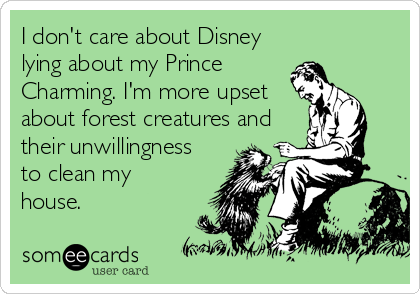
Research is a Myth…or is it a Fairytale?
Okay, so say we have this great idea retelling ‘Beauty and the Beast.’ We’ve seen the Disney movies, and we are happily humming ‘Be our Guest’ as we open the blank Word document. We know the story cold, and we may or may not have a picture of Luke Evans as Gaston tucked away on Pinterest.
We are ready to start writing. Except, we aren’t.
If all we are doing is using the movie as our guide, we have missed out on the fact that the historical fairytale has variations that include a father who was a merchant, a sudden loss of fortune, two wicked sisters, and a pretty sharp lesson about the costs of indecision and not keeping your word. If we haven’t done any research, we wouldn’t know that the the fairytale actually has origins (at least in Western culture) in the Greek myth of Eros and Psyche, or that another lesser-known fairytale – ‘East of the Sun and West of the Moon’ – spun out from that myth.
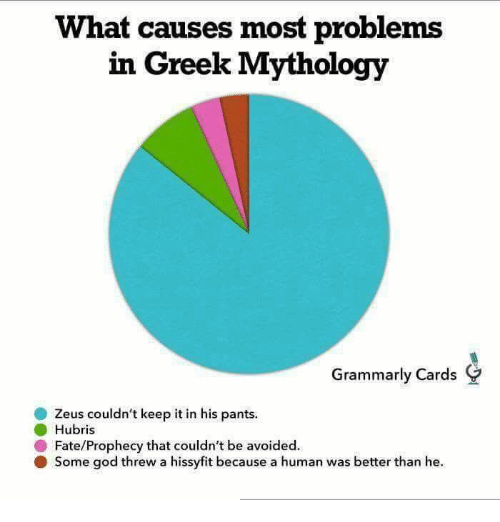
It may seem silly to do research on something that is fundamentally untrue and is by nature fluid and adaptable to time period and culture. Yet, without knowing about the people who wrote the stories, the system of beliefs that the myths came from, and the history of the time when a particular variation was recorded, we are losing out on a chance to delve into subtleties, textures, interpretations, and details that take a retelling from blasé to blazing.
One of the topics I cover in my Once Upon a Plot class is how to go about researching a myth or fairytale, what to pursue, what to set aside, and how to analyze the story in a more complex, contextual way.
World-Building for ‘Then’ and ‘Now’
When we do a retelling, one of the first things we have to decide is the setting. Will it be contemporary? Will it be historical? Will it be futuristic, steampunk, or some medieval-ish time?
This impacts what characters we decide to use, the deeper intricacies and devices of the plot, and the way we represent significant objects from the myth or fairytale (is that a pumpkin or a Porsche?). This is also, sadly, where most writers tend to take short-cuts. They use the generic ‘faux-medieval’ setting that is a haphazard mishmash of culture, technology, and clothing, or they set the tale in today’s world, not really thinking through the implications for characters, decisions, and objects.
A lot of writers use the ‘timeless’ setting in order to avoid doing historical research or any real world-building. Ideas for behavior, costumes, servants, food, castles come from whatever historical drama is on at the time (I’m looking at you, ‘Reign,’ ‘The Tudors,’ ‘The White Queen,’ and ‘The Borgias’). While those medieval-renaissance-ish shows do provide a lot of striking visuals and demonstrate how to make archaic-sounding dialogue accessible to modern listeners/readers, they are NOT to be used for world-building. Ever.
Even for fairytales and myths.
As writers, we are responsible for creating our own worlds, and it is our obligation to the reader to provide a setting that is detailed, well thought-out, and consistent.
Here are just a few of the questions writers should ask when picking a ‘timeless’ setting:
What is the level of technology, industry, medicine, and transportation?
What is the political structure of the ‘kingdom’?
What kind of social mobility or stratification exists within the ‘kingdom’?
What is the kingdom’s primary religion? Are there secondary religions? Competing or conflicting faiths? Holidays and celebrations?
What is the geography, geology, and climate?
What is the overall cultural feel (i.e. generic British, generic Scandinavian, generic Central European, generic Mediterranean?)
That’s just the tip of the iceberg for a timeless setting. If we choose a contemporary setting, that brings a whole other set of issues into consideration, including normalizing any magical abilities within a greater social context, secrets vs. open practices, modern equivalents of historical objects or accessories, and how to maintain a character’s original attitude, purpose, and decisions while grounding him or her realistically in the here-and-now.
Bibbity Bobbity BOOYAH
You guessed it. I’m teaching a class on this very topic. All the details below!
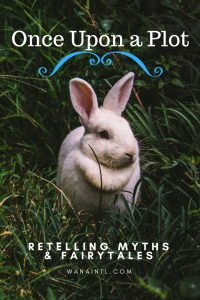 Once Upon a Plot: Retelling Myths & Fairytales
Once Upon a Plot: Retelling Myths & Fairytales
Instructor: Cait Reynolds
Price: $45 USD Standard
Where: W.A.N.A. Digital Classroom
When: WEDNESDAY, August 9, 2017, 7:00 p.m. EST – 9:00 p.m. EST
Myths and fairytales are as fundamental to human existence as communication itself. We grow up hearing these stories, being formed by them, and often rebelling against them.
One of the hottest trends in publishing right now is bringing these stories back and giving them new life with creative interpretations and retellings. Done right, a retelling can capture the public imagination, give us new insights into our society and ourselves, and sweep us away to a time and place where everything, including justice and happy endings, is possible.
Done wrong? A retelling is nothing more than a yawn-worthy yarn full of two-dimensional characters floundering through an unremarkable story with a bland, generic setting.
This class will cover a wide range of topics, including:
How to research a myth or fairytale, from origins to variations;
How to analyze in order to develop a deeper, richer understanding of the stories;
How to pick out the key elements, from characters and attitudes, to objects and settings;
Creating contemporary settings for retellings that are accurate, believable, and flexible enough to accommodate ‘magic’;
Creating ‘timeless’ settings that are unique, consistent, and immersive.
A recording of this class is also included with purchase.
GOLD PACKAGE
You get the class (recording included in price) with Cait plus one hour of personalized one-on-one consulting regarding YOUR story.
PLATINUM PACKAGE
You get the class (recording included in price) with Cait plus two hours of personalized one-on-one consulting regarding YOUR story and bonus worksheets. These worksheets will efficiently guide you through in-depth world-building and research, providing you with consistency for your writing and an excellent reference/style sheet for your editor and proofreader.
About the Instructor
 Cait Reynolds is a USA Today Bestselling Author and lives in the Boston area with her husband and four-legged fur child. She discovered her passion for writing early and has bugged her family and friends with it ever since. When she isn’t cooking, running, rock climbing, or enjoying the rooftop deck that brings her closer to the stars, she writes.
Cait Reynolds is a USA Today Bestselling Author and lives in the Boston area with her husband and four-legged fur child. She discovered her passion for writing early and has bugged her family and friends with it ever since. When she isn’t cooking, running, rock climbing, or enjoying the rooftop deck that brings her closer to the stars, she writes.
****And MAKE SURE to check out the classes below and sign up! Summer school! YAY! We’ve added in classes on erotica/high heat romance, fantasy, how to write strong female characters and MORE! So scroll down and sign up!
For the month of JULY, for everyone who leaves a comment, I will put your name in a hat. If you comment and link back to my blog on your blog, you get your name in the hat twice. What do you win? The unvarnished truth from yours truly.
I will pick a winner once a month and it will be a critique of the first 20 pages of your novel, or your query letter, or your synopsis (5 pages or less).
NEW CLASSES WITH USA Today Best Selling Author CAIT REYNOLDS!
Obviously, I have my areas of expertise, but I’ve wanted for a long time to fill in some gaps on classes I could offer.
Cait Reynolds was my answer.
She is an unbelievable editor, mentor and teacher and a serious expert in these areas. She consults numerous very successful USA Today and NYTBS authors and I highly, highly recommend her classes.
Gaskets and Gaiters: How to Create a Compelling Steampunk World August 11th $45 w/ Cait Reynolds
Lasers & Dragons & Swords, Oh MY! World Building for Fantasy & Science Fiction July 28th w/ Cait Reynolds $35/ GOLD $75/ PLATINUM $125
Baby It’s Hot in Here—Writing Erotica & High Heat Sex Scenes August 4th $45 General/ $90 GOLD/$150 Platinum
Classes with MOI!
Branding for Authors July 27th $35
Elements of Literary—How to Write Character-Driven Stories August 3rd $40
Beyond Planet X, Monsters & Chainsaws–Mastering Speculative Fiction August 10th $35
Classes with Award-Winning Author Lisa Hall-Wilson
Growing An Organic Platform On Facebook July 22nd $40
Method Acting for Writers—How to Write Deep POV August 1st $85 (two-week intensive class & lifetime access)
Beyond Lipstick & Swords—Writing Strong Female Characters September 9th $40
July 24, 2017
Science Fiction, Horror & More—Why Speculative Fiction Matters
On Friday, we explored how shame is the beating heart of great fiction, how probing the shadow sides of human nature is what can separate the mundane from the magnificent.
All fiction has its place. Some fiction is purely fun and escape and the world needs more fun and feel good. Certain books are simply a holodeck to get away from the mundanities of life, the overwhelming pressures of being an adult (kids, laundry, bills, car repairs). They serve as a place of rest and we all could use more of that!
But that isn’t all fiction.
Many writers (myself included) desire to go far deeper with our fiction, explore wounds and human issues, poke and prod at larger social dilemmas using the narrative form to expose that which is diseased and show it can be overcome. Speculative fiction is an excellent outlet for this. This genre offers a myriad of ways to help us mere humans face all the stuff we fear the most.
I am breaking out of my comfort zone and now offering new classes specifically for the genres I love and read the most. In August I have a class on Speculative Fiction and one on Character-Driven Stories (which includes but is not limited to literary fiction and can greatly enhance genre fiction) before I leave for New Zealand to keynote.
Why did I pick these two to start with? These are my favorite kinds of books to read, which means I’ve read a lot of these kinds of stories. I also find it fascinating how (believe it or not) great speculative fiction has a lot more in common with literary than one might believe.
What is Speculative Fiction?
Speculative fiction is an umbrella term used to describe narrative fiction with supernatural or futuristic elements. This includes but it not necessarily limited to fantasy, science fiction, horror, utopian, dystopian, alternate history, apocalyptic fiction, post-apocalyptic fiction.
Basically, all the weird stuff.
(And forgive me because today we are using seriously broad strokes.)
But what makes the difference between the laughable 1950s science fiction matinees and the long-forgotten pulp fiction versus the works of Philip K.Dick? What makes The Road literature even though it’s a post-apocalyptic novella? Why is Heart-Shaped Box or Wool so deeply disturbing and simultaneously resonant?
Why do star-packed big-budget films like Jupiter Ascending fizzle? Yet Blade Runner is a science fiction staple worthy of being remade for the newest generations to enjoy?
Plot
It’s easy to dismiss speculative fiction as escapist fluff and some of it is. But, when we look to the great speculative fiction, we see the authors are disguising explosive social commentary within narrative so it can be viewed and experienced behind the safety-glass/containment field of story.
By using story, we writers place the reader into this world then (hopefully) generate empathy that is impossible to create any other way. I’ve seen the movie I, Robot countless times and I bawl EVERY time during this scene.
Yeah this is me…
Stepford Wives was a commentary on the women’s liberation movement. Animal Farm was a treatise on socialism and the dangers of groupthink. The peril that comes with handing over too much power to those who claim to have noble and benevolent intentions without asking the hard questions.
Brave New World was Huxley’s stab at a culture propelled by temporary highs, unlimited choices and instant gratification while rejecting that which endured (love, family, marriage), because that which lasted required time, sacrifice and work. He showed us an eerily accurate picture of what society could become if we were not vigilant…and is now probably rolling in his grave.
*Makes note to write story about Huxley haunting Instagram*
Do Androids Dream of Electric Sheep? was Philip K. Dick’s commentary on artificial intelligence and just because we can play God, should we? What sort of moral implications are involved? These are issues we are now facing for real, that are no longer fiction and we are being tasked with the tough questions.
Is it wise to create and sell sex robots that come with a “frigid” setting? What happens when we extend the logic of this? Blade Runner. We get Blade Runner. Also a bizarre escalation/reinvention of the previously mentioned Stepford Wives.
All these great science breakthroughs that float across our newsfeed are now fertile ground for new and possibly even better stories that prod the science with ethical dilemmas.
We show the world it’s upside down and maybe even ways to right it.
I believe that the great speculative fiction writers have always been the conscience of culture, the voice that whispers things like, “Just because we can, doesn’t mean we should.” Or, “This really is a big deal and can go ugly really easily.”
Horror does a lot of that as well. Good horror writers tap into the subconscious angst and gives it a face. What happens when society is allowed to continue to devalue human life? When mobs are handed permission to call the shots? Let’s chat about this after watching The Purge.
To Make it BIGGER, Make it Smaller
When we care about everything, we care about nothing. Additionally, the human mind can’t truly grasp the loss of a billion lives. It doesn’t resonate because it can’t compute.
Thus the great spec-fic plots make the big small. We tell a small story of one person or a group of people as it plays out on the far larger stage. World War Z anyone?
This is why so many Hollywood movies about asteroids hitting the planet fizzle while The Road simply guts us.
Not All Big Stories are Big
Sometimes speculative fiction isn’t addressing something big, rather it dives into the intimate and deeply personal. Heart-Shaped Box is about a vengeful ghost out to destroy an aging rock star and anyone he loves. While the supernatural elements are terrifying, what is so beautiful and moving about this story is how the characters are forced to face and conquer inner demons they would have been happy to bury if not running for their lives.
The human story is what elevates this from a forgettable scary book into a work that prods at the deep dark places of the characters (and by extension the reader).
Character
Writing speculative fiction is really tough. It has a lot in common with literary in that it can turn preachy or fall flat so easily. Too many writers get fixated on world-building, when world-building is backdrop and can never substitute for story.
Spec-fic is tough and I swear it is the souffle of fiction. If we aren’t careful and look away one second? Yeah.
Plot of course matters in that we need a core story problem to drive the story, but characters are vastly important (possibly even more important). We must develop multi-dimensional characters with flaws and problems to set on this adventure because gizmos, gadgets, spaceships, magic, chainsaws, gore and ghosts alone are not a story.
We don’t need a bigger asteroid…we need a better story. Story is what is going to rattle the cage, not the two-ton spider. More blood or teeth won’t scare us and won’t change us.
In a world where we are overwhelmed with doom and gloom, where any debate on-line easily devolves into ranting, I think spec-fic is more important than ever in human history. Story is the place where the armor goes off and the heart is exposed and then able to be changed, fixed, remolded, and softened.
What are your thoughts? Do you love horror? Dystopian? Science fiction? What are your favorites? I LOVE HEARING FROM YOU! What makes spec-fic great? Or fall flat? What are your pet peeves?
I love speculative fiction, even though it took about 4 years to figure out what other writers meant by “speculative fiction.” I am a horror and science fiction JUNKIE. And I love the good stuff, the stories that poke and prod and that people can’t help talking about, debating, discussing in a way no Facebook rant-fest can. Which, again, is why I am thrilled to be offering a new class on it!
****And MAKE SURE to check out the classes below and sign up! Summer school! YAY! We’ve added in classes on erotica/high heat romance, fantasy, how to write strong female characters and MORE! So scroll down and sign up!
For the month of JULY, for everyone who leaves a comment, I will put your name in a hat. If you comment and link back to my blog on your blog, you get your name in the hat twice. What do you win? The unvarnished truth from yours truly.
I will pick a winner once a month and it will be a critique of the first 20 pages of your novel, or your query letter, or your synopsis (5 pages or less).
NEW CLASSES WITH USA Today Best Selling Author CAIT REYNOLDS!
Obviously, I have my areas of expertise, but I’ve wanted for a long time to fill in some gaps on classes I could offer.
Cait Reynolds was my answer.
She is an unbelievable editor, mentor and teacher and a serious expert in these areas. She consults numerous very successful USA Today and NYTBS authors and I highly, highly recommend her classes.
Gaskets and Gaiters: How to Create a Compelling Steampunk World July 21st $35 w/ Cait Reynolds
Lasers & Dragons & Swords, Oh MY! World Building for Fantasy & Science Fiction July 28th w/ Cait Reynolds $35/ GOLD $75/ PLATINUM $125
Baby It’s Hot in Here—Writing Erotica & High Heat Sex Scenes August 4th $45 General/ $90 GOLD/$150 Platinum
Classes with MOI!
Branding for Authors July 27th $35
Elements of Literary—How to Write Character-Driven Stories August 3rd $40
Beyond Planet X, Monsters & Chainsaws–Mastering Speculative Fiction August 10th $35
Classes with Award-Winning Author Lisa Hall-Wilson
Growing An Organic Platform On Facebook July 22nd $40
Method Acting for Writers—How to Write Deep POV August 1st $85 (two-week intensive class & lifetime access)
Beyond Lipstick & Swords—Writing Strong Female Characters September 9th $40
July 21, 2017
The Reason Shame is the Beating Heart of All Great Stories
 Image via Flickr Creative Commons courtesy of frankieleon
Image via Flickr Creative Commons courtesy of frankieleonI read a ridiculous amount of novels and I’m very picky, namely because I have the attention span of a fruit fly with a crack habit. Like most modern readers, it takes a lot to grab then keep my attention.
Most books I end up putting down or returning to Audible for another. There are books I finish then forget. Most are meh. Good way to kill time not much more. But then there are the ones that stick, the stories I never grow tired of reading and rereading and recommending and as you can see, I have very eclectic taste.
Some of my fondest loves are Heart-Shaped Box, Big, Little Lies, American Gods, Prisoner of Hell Gate, The Joy Luck Club, Luckiest Girl Alive, the Harry Bosch series by Michael Connelly, The Lincoln Lawyer, and anything written by Fredik Backman Britt Marie Was Here being my favorite.
Yet what do all these great stories have in common? Why do they make me laugh and cry and cheer? What is so cathartic about these books?
Shame.
Deep, profound, gut-wrenching and very identifiable shame.
The content of this blog is actually from a guest post I did for Rachel Thompson. But I think it’s a valuable lesson, especially for the new writers who haven’t yet developed the rhino skin to dare to be vulnerable themselves, let alone with their characters.
So I shall go first….
Back in 2002 when I finally made the decision to become a novelist, I had no idea what kind of a personal journey I’d signed up for. In fact that could make an entire book—okay series of books—in and of itself.
When I started writing I was not a very nice person (and that’s putting it mildly). I was angry, self-centered, bitter, undisciplined, and immature. But I did have great hair so it wasn’t a total loss.
In short? I was a jerk.
Often though, the trouble with jerks is they are the only ones unaware they are jerks. Kind of like that movie The Sixth Sense.
I see jerks. Everywhere. Walking around like regular people. They don’t see each other. They only see what they want to see. They don’t know they’re a jerk.
Yeah, that was me. It was everyone else. Everyone else was responsible for ***insert emotion/problem/drama here***.
And maybe this isn’t a very useful post for you because you’re all wonderful, perfectly adjusted individuals who rescue kittens when you’re not knitting onesies for cold baby goats. But maybe what I have to say today can help…a friend 
July 19, 2017
Lasers, Swords, and Brianna, oh, my!
It’s Squatter’s Rights Wednesday! I’m back, along with Denny Basenji, opinions on words, and a new haircut.
Also, I do know that I owe everyone my freshman year high school photo. I will post that on Friday. *pinky swear*
So, today, I’m talking about world-building for epic fantasy and science fiction. Of course, there are specifics to each genre that could merit their own blog post (and will eventually get their own blog posts), but for today, I want to talk about what they both have in common, especially when it comes to creating a world that is paradoxically both alien and familiar, comfortable and unpredictable, and just as human as you or I – tentacles notwithstanding.
Two Peas in an Alien Pod
Why are epic fantasy and science fiction similar, you ask? Well, let’s start with the most fundamental problem both face. It’s a misconception on the part of writers that regularly drives me to call upon the holy, withering powers of the Red Pen of Wrath.
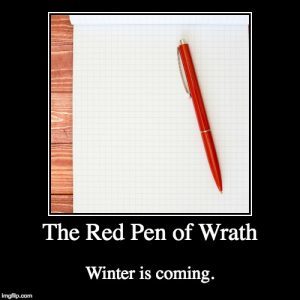
The problem is this: a premise is not a plot.
I am just as guilty as anyone when it comes to this. I would get the coolest idea for an epic fantasy story with dragons, or a magical sword, or…or…a shy, downtrodden young girl who comes into her magical inheritance and has to save the world. Or, even worse…a space opera or an oppressive alien society bent on conquering a post-apocalyptic Earth…
You get the idea. And, that’s all it is. An idea. It’s a premise, a setting, the faintest concept sketch of a backdrop. It is not a plot. While the plot and characters are shaped by the world we build, we must first have a firm idea of the actual story we want to tell before we go indulging in literal flights of fantasy.
The best, most enduring, and most powerful epic fantasy and science fiction tell stories that are rooted in deep philosophical and ethical questions about how humanity (no matter what the species “we” are in the story) makes choices when pushed at warp speed into a magical corner.
A premise is great, but what is the burning reason why we need to write this story using this setting? If we can answer this question, then we are on the right track and are good to keep going with our world-building.
Culture Shock
Let’s just put it out there from the get-go.
Fantasy that uses the ‘faux medieval fallback’ is lame. Worse, it’s lazy, and I am not going to waste the precious hours of my life reading that crap. If an author can’t be bothered to build a world that goes beyond throwing in some Lord-of-the-Rings-style magic into ‘The Princess Bride,’ then, I can’t be bothered with his or her book.

Science fiction that so blatantly ignores human nature is also lame to the point where it can undermine the believability of an entire premise. For example – and yes, this is going to be controversial, and don’t flame me if I got it wrong because this is based on a memory from years and years and years ago – when I was watching Star Trek: The Next Generation and Captain Picard said that we had evolved beyond the need for money, I laughed. And then, I got mad. Seriously??? I don’t care if it’s dollars or hotel points on Risa, you cannot convince me that given the nature of the personal and psychological problems the TNG cast dealt with demonstrated that humanity had evolved beyond our basic competitive biological nature. We would need some serious genetic rewiring in order to let go of our need to gather and accumulate resources. When I could forget that little issue, sure, the whole premise was great. When I couldn’t? It was like a bad itch with no ideological cortisone to hand.
The absence of technology does not mean a society has to be simplistic with two-dimensional characters like the mustache-twirling villain or the reluctant young hero with chronic self-esteem issues. Conversely, the presence of technology doesn’t automatically cancel out all of society’s more complex, sticky social issues.
Good world-building in these genres should be an uncomfortable process. It should poke and prod at the difficult questions we tend to avoid on an everyday basis. We know we are doing it right when we feel a kind of culture shock, just like when we wake up at 3:00 a.m. in a strange hotel room on the first night of a trip to a foreign country. Sure, it’s a bed and a room, but something about it just feels fundamentally different, no matter how much it is the same.
The More Things Change
When we are creating a future or fantasy world, we obviously have to cover all the bases of politics, religion, education, economics, industry, regionality, food, etc. It’s the kind of exercise in thinking, imagination, and logic that forces us to play every idea six moves out to see if it still works and what else it might effect. However, almost more important than the differences we create are the similarities that we keep.
Not everything needs to be changed and/or renamed. That’s not world-building. That’s complication, not complexity. It’s also the biggest and easiest trap for us to fall into.
A world that is over-complicated and needlessly different puts and keeps distance between the story and the reader, and that’s not even dipping a scaly alien toe into the issues of character development.
So, how do we determine what needs to be changed? Some of it comes from the necessities of the plot, and some of if comes from the implications of physical realities of the setting itself (Dune is a great example of this). At the end of the day, though, we need to ask ourselves some basic questions every time we want to change something:
Is it relevant to shaping the character’s personality, motivations, and decisions?
Is it necessary to the plot on a macro or micro level as a source of conflict?
Can it be used as a stressor to up the tension or accelerate the pace?
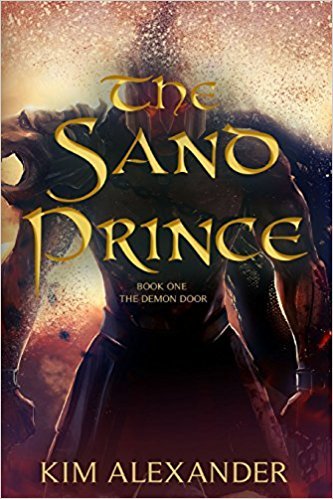 The Sand Prince by Kim Alexander
The Sand Prince by Kim AlexanderOne of the absolutely best examples of this that I have recently read is Kim Alexander’s The Sand Prince. It’s not just epic fantasy and an astoundingly exquisite example of world-building. It’s a riveting, meaningful story with characters I identify with and have come to care about deeply. If you read it (and you should), look at the way she uses food and colors to drive home desperation, hopelessness, anger, and stress. That’s just one small way she uses details to up the stakes for her characters and relentlessly drive the story toward its riveting climax.
And on the Seventh Day, Cait Taught a Class
If you’re feeling exhausted and perhaps even a little overwhelmed by this post, don’t worry. You’re not alone. Even God needed to rest on the seventh day, proving once again that world-building is hard.
However, even God had a system for creation, and I am teaching a tiny, pale version of that on Friday, July 28, 2017 from 7:00-9:00 p.m.
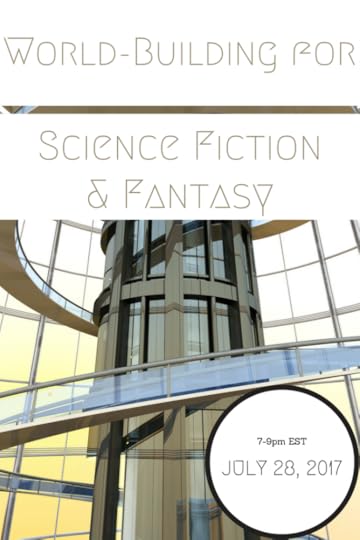 Class Title: Lasers & Dragons & Swords, Oh MY! World Building for Fantasy & Science Fiction
Class Title: Lasers & Dragons & Swords, Oh MY! World Building for Fantasy & Science Fiction
Instructor: Cait Reynolds
Price: $35 USD Standard
Where: W.A.N.A. Digital Classroom
When: FRIDAY July 28th, 7:00 PM E.S.T. to 9:00 P.M. EST
Science Fiction and Epic Fantasy are the double agents of the literary world. They simultaneously provide exotic escapism while at the same time serving as a ruthless mirror of contemporary society.
Whether it’s magic or technology, these genres bend rules and toy with the impossible.
However, it is also perilously easy to fall into the trap of bending every rule to make it easy for yourself, your plot, and your characters. When the fantastic becomes too fantastical, your world begins to lose its magic, and readers begin to distance themselves from the emotional impact of the actual story.
This class will cover a wide range of topics, including:
– Etymology: If you are going to make up names for people, places, food, customs, magic/technology, etc., you need to understand the fundamental rules of creating language.
– What’s normal and carries over from our world/time and doesn’t need description vs what is different and should be described
– How much magic or science do you have to know in order to build your world effectively?
– How to keep it real: tips and tricks for keeping your characters relatable to readers, even if they have tentacles/magical powers/chip implants.
– Spotting tired tropes and DOING BETTER. Make your fiction unique. No retreads! “Oh no, not another young, timid girl who becomes magical/laser-wielding social warrior!”
In a world of a gazillion forgettable fantasies and sci-fi stories, let Cait help you take your WORLD & STORY to a WHOLE NEW LEVEL. When world building is done right? Fans will be BEGGING to do fan fiction with the worlds you create.
World Building GOLD
You get the class (recording included in price) with Cait plus one hour of personalized one-on-one consulting regarding YOUR story.
World Building PLATINUM
You get the class (recording included in price) with Cait plus two hours of personalized one-on-one consulting regarding YOUR story and bonus worksheets. These worksheets will efficiently guide you through in-depth world-building and research, providing you with consistency for your writing and an excellent reference/style sheet for your editor and proofreader.
***
For the month of JULY, for everyone who leaves a comment, I will put your name in a hat. If you comment and link back to my blog on your blog, you get your name in the hat twice. What do you win? The unvarnished truth from yours truly.
I will pick a winner once a month and it will be a critique of the first 20 pages of your novel, or your query letter, or your synopsis (5 pages or less).
NEW CLASSES WITH USA Today Best Selling Author CAIT REYNOLDS!
Obviously, I have my areas of expertise, but I’ve wanted for a long time to fill in some gaps on classes I could offer.
Cait Reynolds was my answer.
She is an unbelievable editor, mentor and teacher and a serious expert in these areas. She consults numerous very successful USA Today and NYTBS authors and I highly, highly recommend her classes.
Lasers & Dragons & Swords, Oh MY! World Building for Fantasy & Science Fiction July 28th w/ Cait Reynolds $35/ GOLD $75/ PLATINUM $125
Classes with MOI!
Blogging for Authors July 20th $50 ($150 for GOLD)
Branding for Authors July 27th $35
Classes with Lisa Hall-Wilson
Growing An Organic Platform On Facebook July 22nd $40
July 17, 2017
Deep POV: Using Personal Vows To Increase Story Tension
 Image courtesy of Rune E.’s generosity via Flickr Creative Commons
Image courtesy of Rune E.’s generosity via Flickr Creative CommonsAh personal vows. I’m big on those and one core vow I made several years ago was to seek out the best of the best. Locate talent, nurture it, then share it with you guys. I’m passionate about mastery. Mastery however requires sacrifice, and that sacrifice is we cannot do all things. We need to let go. Knowing that, I made it my personal mission (and my company W.A.N.A. International’s mission) to recruit those who were masters of THEIR realms.
My motto? If I am the smartest person in the room, I’ve done something horribly wrong.
Many of you have already had the pleasure of taking a class with USA Today Best-Selling Author Cait Reynolds. If not? She has a whole list of classes coming up (listed below). Today, however, another master is here to share her gifts with us today.
Lisa Hall-Wilson is one of the best teachers I’ve ever had the honor to work with. She taught me Facebook 

